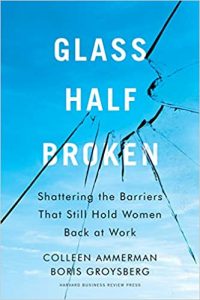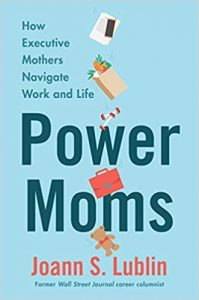And still we rise (beyond the glass ceiling)
You may write me down in history
With your bitter, twisted lies,
You may trod me in the very dirt
But still, like dust, I’ll rise. – Maya Angelou

Despite the inroads generations before us have made, gender bias at the workplace is still prevalent today. While the discussion of gender roles at work has advanced significantly in the past few decades, executive women have found blatant interpersonal exclusion to be a consistent theme across industries. In a study led by Colleen Ammerman and Boris Groysberg at Harvard Business School, the authors discovered 40 percent of men believed their gender had been an advantage in advancing their careers. They found the number of female CEOs still struggles to reach the 10 percent mark across a variety of indices. In their upcoming book Glass Half-Broken: Shattering the Barriers that Still Hold Women Back at Work (Harvard Business Review Press, release date: April 13, 2021), they offer solutions to not only cracking the glass ceiling that holds women hostage to unfair hiring practices, but also to shattering it altogether. In the end, it comes down to evolving the workplace into an inclusive culture with talent management practices and policies that reflect real-life issues women face every day.
Who better to address these issues than long-time Wall Street Journal career columnist Joann Lublin, one of the newspaper’s first female journalists and among the first to take maternity leave and return to work? In her new release Power Moms: How Executive mothers Navigate Work and Life, Lublin painstakingly recounts the stories behind the interviews she held with 86 executive mothers from both the trailblazing Boomer generation and Generation X. Their experiences reveal how women have managed to push through barriers at work. Dismissing the work-life balance myth, Lublin showcases the work-life sway these women achieve to remain in positions of power while raising a family.

The book incenses and inspires as it illustrates how far executive women have had to go to maintain their positions at work. Take Genevieve Aronson, the North American vice president of communications at the TV ratings company Nielsen, who gets up three times a week between 2 a.m. and 3 a.m. to “get a jump on the day.” In a Zoom interview, Lublin assured me she did it voluntarily because it was when she could be most productive. For years prior to children, the New York executive slept with her phone in her hand. Stacey Tank, a young executive mom who had climbed the ranks to be senior vice president at Heineken, USA, held numerous conference calls from her hospital bed while suffering from preeclampsia during her pregnancy. She tried her best to mute the sounds of the machine to which she was hooked up. Another executive, Meaghan Schmidt, a managing director for a global management consulting firm, had fought so hard for a literal seat at the table that she continued a meeting as the only woman in the room with ten male participants while having a miscarriage in a Manhattan boardroom.
“These women felt they had earned a place at the table, a role they were not willing to give up any under circumstances,” Lublin explained. “Their choices reflected the Boomer generation of women before them who had fought so hard and long to get there.” Dr. Sera Lavelle, Clinical Psychologist with NY Health Hypnosis & Integrative Therapy, offers a different view. In an email interview in which I asked what motivates women to go to such lengths to hide their family status, she wrote: “Women are judged more harshly than men for taking maternity leave. Where a man may be seen as being a supportive father and deemed more competent, it is more likely that the same employer would be concerned about a woman’s leave, deeming her as less committed to the job. As women, we often internalize this pressure, and feel like we need to work extra hard to counter any perceived notions our employer may have about us, at the same time needing to prove to ourselves that we will be able to juggle both.”
Clearly, the tone at work is set at the top. Former Avon Products CEO Andrea Jung, who now heads a microfinance non-profit organization, routinely allowed employees to leave work due to family issues. As the mother of two young children herself, she is committed to alleviating working mother guilt. According to an Edison Research study, 87% of full-time working moms surveyed take on all or most parenting responsibilities, while only 83% of stay-at-home moms do the same. A Bright Horizons study found mothers with the higher paycheck were twice as likely to arrange all family responsibilities as breadwinning fathers. When asked about these statistics, Lublin suggested mothers carry a certain level of guilt whether they work or not. Mindy Grossman, the CEO of Weight Watchers, had a coast-to-coast commute while working for Nike, visiting only every four to six weeks to see her toddler and husband. Coming home at 1 a.m., she found herself picking up toys and straightening the house until she realized how ridiculous it was to do such a thing after being away for so long. When Mindy’s daughter had children of her own, she swung in the opposite direction by deciding to be a stay-at-home mom. And yet she too is plagued with guilt when she takes time for herself.
While mother guilt is perhaps a pervasive issue no matter our working status, there are ways in which women can advance their careers without being wracked with negative feelings. Laurie Ann Goldman, a boomer power mom and former Coco-Cola company executive who also headed Spanx as CEO, negotiated an employment contract in which the company had to agree to her obligations beyond work that included family and community commitments that might take her out of the office during regular working hours. According to Lubin, “The biggest change that organizations can make to ensure women of every level can benefit is by changing the corporate culture.”
Several ways to shatter the glass ceiling include making it acceptable for both genders to transition into their roles as parents by taking maternity and paternity leave when their children are born; promoting women into high-ranking roles; offering internal events in which women can talk about how they advanced their careers to get into a leadership position; providing mentoring programs in which women executives allow lower-ranking women to shadow them for a few days to learn tiny tricks of the trade; and normalizing the home office environment, which the pandemic has shown can be equally effective.
I would add that bringing more Slow to our lives would alleviate the craze of trying to squeeze more hours out of the day than we truly have. As Lublin, a Pulitzer Prize winner herself, lovingly stated in a closing thought, “No one is perfect. Not our children. Not our spouses. Not our employers. Not ourselves. Accepting that helps.” Here is to the power of moms, no matter their rank. May the Slow be with them as they rise.
*This article originally appeared on PsychologyToday.com under the title “Will the Glass Ceiling Ever Fully Shatter?”
Leave a Reply